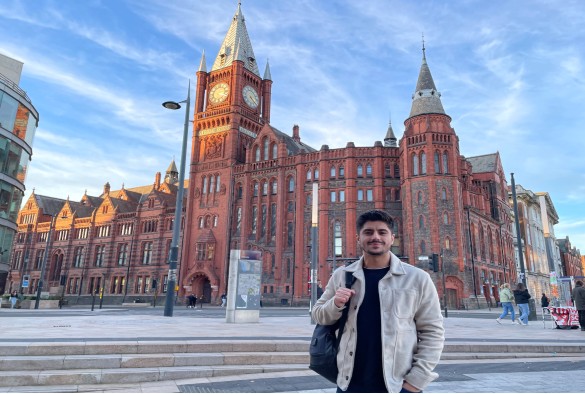
Mustafa Rezazadah, an MSc Strategic Communications student at the University of Liverpool tells the powerful story of his recent evacuation from Afghanistan and his journey to Liverpool to begin his studies.
When the Taliban came knocking on my door
On 15 August, 2021, about 10am, I received a call from my friend. “Where are you?”, he asked. I said, “I am at the office, why?”. He then told me, “Pack your bag and go home now. They are here. The Taliban reached the southern part of the capital”. In less than 30 minutes, I moved the important files to a safer place and left the office. When I exited the compound, I realised that the streets were clogged with people, as if there had been a tsunami or earthquake. People were shocked and terrified, so was I.
The Taliban came knocking on my door two days later. I caught a glimpse of them through the peephole but did not open the door. I am still unsure why they came. Was it because I worked in the media industry? Or did they merely knock on my door by accident? God knows! But I am aware that they tortured and killed several artists, journalists, religious scholars, political leaders, and interpreters during that time.
Since then, I have not left my house. In a single day, I spent over 18 hours on social media. I continued monitoring the news and my friends’ social media posts flowing about the incidents taking place across the country. Every morning I woke up with the hope to I hear the international community issue a joint statement condemning the Taliban takeover and taking urgent action against them, but nothing happened.
Evacuation from Afghanistan
On 21 August, I received a phone call informing me that you will be evacuated by the French government within the next 24 hours. Because the evacuation will take place via military aircraft, I was only allowed to bring one handbag. I only took my university diploma, laptop, and a few clothes with me when I left my house for the airport, carrying only one handbag.
The videos from the Kabul airport, particularly the fall of several passengers from the aircraft wing, were a global trend at the time. People were comparing the airport visuals to Zombie films like World War Z. To be honest, the photographs and chaos looked a lot alike, but there were no zombies among those throng. They were the country’s best educated and elites who were attempting to flee. They fled the country for fear of losing their lives as well as their rights to education, participation, and freedom.
When I arrived at the airport, I observed the crowd people with and without documents, but no one was able to pass the barriers and enter the airport unless the foreign military in charge of the airports permitted it. I waited for 20 hours amid the gunfire, sound bombs, and the scream of children and families, but I still couldn’t get close enough to the fences. Then I tried the Taliban-controlled second gate. But after seeing the Taliban hitting men and women there, I returned and headed for the last alternative, which was the northern gate, also known as Abbey Gate (Four days later, 200 Afghans, 13 US service members, and two British citizens were killed in a suicide attack at the same gate.). Fortunately, with the help of the French soldiers, a group of artists and people working in media were able to enter through this gate. They led us into the French camp, which was both safe and reassuring.
Later that night, we were preparing to take the plane from Kabul to our final destination, Paris. The most painful part of this journey was when I sat in the ground behind a fence at 2:00am in my own country, waiting for military planes to evacuate me.
News from Liverpool
I had finally arrived in Paris and had no idea what I would do next. In the span of a week, my entire life changed dramatically. But here is a happy part of the story. I received an email from the University of Liverpool on 24 August. Professor Gavin Brown, Pro-Vice-Chancellor for Education, wrote an email, on behalf of the International Advice and Guidance team, to University of Liverpool Afghan students and offer-holders, offering counselling and financial assistance. I responded, explaining my background, career goals, and desire to continue my studies as an unconditional offer-holder of MSc Strategic Communications for the fall class of 2021. The University management was exceedingly gracious in providing me with a full scholarship. My student visa was also processed in one day by the Home Office—thanks to them. I arrived at the University of Liverpool on 27 September 2021, carrying the same handbag with which I had left my country on 21 August.
The pro-active approach of the University in my case is a great example of values that the University of Liverpool always talks about. The values of inclusivity, social responsibility, and an enabling community.
Speaking up for Afghanistan
While I was enjoying my studies in my first semester at the University of Liverpool, my mind still remained busy thinking about the situation in Afghanistan. At that time, it had been a month since women were prohibited from attending school or working in government, international flights had been halted, money transfers from and to the country had been halted, and poverty increased.
Now, Afghan people require international assistance and activism now more than ever. Please speak up for Afghanistan, for human rights and freedom. If you have a message in the format of a text, audio or video, please submit it to standwithafghanistan@gmail.com or to its Instagram account.